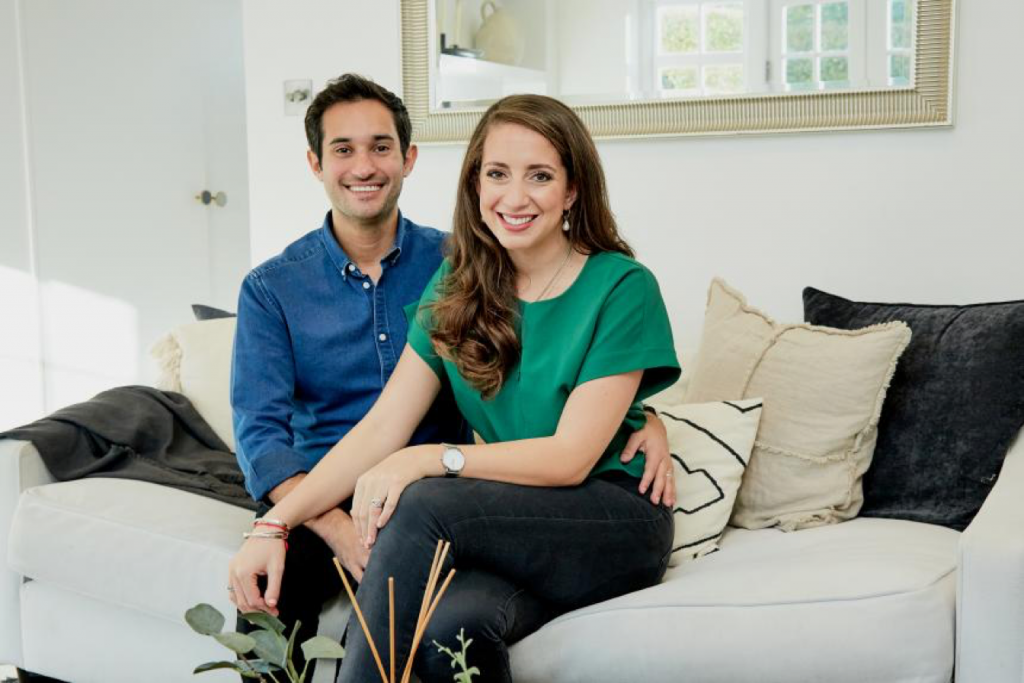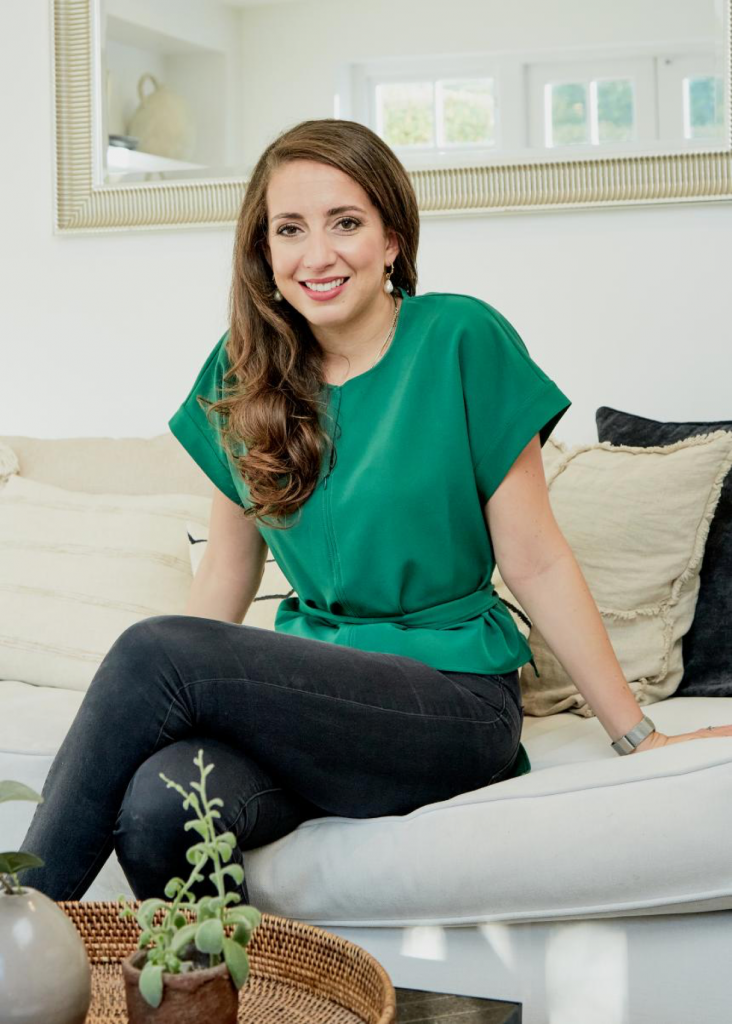“I wondered why I couldn’t conceive — I found out I had endometrial cancer”
Tori Tenzer was diagnosed by chance after she struggled to get pregnant at 28. She fears other cases could be missed
“I wasn’t sitting in the doctor’s surgery awaiting my test results when I was diagnosed with cancer. I was working at home on a sunny Friday afternoon in July, preparing for a presentation. Then I received a call that would change my life for ever.
I’d been expecting fertility results from an endometrial biopsy. My husband, Ollie, and I had been trying for a baby for nearly a year with no success. When my gynaecologist Dr Ian Currie called, cancer was the last thing on my mind — I just wanted to find out why, aged 28, I hadn’t become pregnant. He phoned me from a noisy train, en route to see his father, who was dying from Covid-19. “You need to be referred urgently to an oncologist,” he said. Time froze.
The days between that call and the oncologist appointment are a blur. I remember thinking we had to keep busy, but all we wanted to do was curl up on the sofa and pretend that none of this was happening. We resisted the temptation to google, knowing that it would not give us any reassurance. I’ll never forget how broken and helpless my parents looked when I told them on the Saturday.

Fast-forward four days to my oncologist appointment. I was diagnosed with stage one endometrial cancer and immediately sent for an MRI scan to check that it hadn’t spread. Thankfully, it had not.
While I was relieved that it had been caught so early, there were still so many unanswered questions. Why had I got a cancer that is most prevalent in postmenopausal women and those who are overweight? I was neither of those. I didn’t have any symptoms, such as bleeding between periods or heavier periods than usual. I didn’t even have a history of cancer in my family. None of it made sense to me or my oncologist.
In the UK endometrial cancer, also referred to as uterine or womb cancer, is the fourth most common cancer among women, but rates are highest in those aged 75 to 79. There are about 15 women aged 25 to 29 diagnosed with this form of cancer in the UK each year. Just 5 per cent of diagnoses worldwide are in those under 40. I was now one of them.
Most womb cancers begin in the cells that make up the lining of the womb (the endometrium). The main symptom is vaginal bleeding and a watery discharge. Because most women diagnosed with womb cancer have been through the menopause, any vaginal bleeding will be unusual. In women who have not been through the menopause, unusual bleeding means heavier periods or spotting in between normal periods. Less common symptoms include discomfort in the lower abdomen and during sex. If endometrial cancer reaches a more advanced stage, it may cause pain in the back, legs or pelvis. My only clue was my inability to get pregnant.
About eight in ten uterine cancer patients receive major surgical resection (that is, a surgical operation that when performed on a cancer patient would be an attempt to remove the tumour). The standard treatment for endometrial cancer involves total hysterectomy, which is the removal of the womb, cervix, both fallopian tubes and ovaries. Surgery is sometimes followed by radiotherapy or chemotherapy. A hysterectomy alone has excellent survival outcomes, especially in early stage cancers like mine. However, it leads to permanent loss of fertility. Since that first call from my gynaecologist, I hadn’t registered that my cancer would affect my ability to have children.
Thankfully, there was another option — an extremely high dosage of progesterone, which I’d have to take daily for a year. This is because most stage one cancers are thought to arise from hormonal imbalances. There was a 75 per cent chance that it would work, but there was no certainty. I would need to have a biopsy every three months to monitor the cancer. If the cancer got worse or did not improve, I was going to have a hysterectomy then and there.
We had to learn to live our life in blocks of three months. In the space of a few hours I could go from feeling grateful that they had found it so early to feeling as if my whole world were crashing down.
Since my cancer and my treatment were not visible to anyone else — and given that the pandemic meant limited social contact — I could have easily carried on without telling anyone. Yet soon after my diagnosis I realised that I couldn’t stay quiet. I couldn’t meet friends and have them asking me how I was without breaking down. I knew I couldn’t continue to perform at work. I couldn’t handle jokes about when we were going to have a baby.
So we told close friends and colleagues. I knew I wasn’t ready to pick up the phone, so I wrote a Whatsapp message instead. I chose my words carefully. I didn’t want this to define me. It took a week or so for me to have the courage to answer the phone. I soon realised that many people didn’t know how to act or what to say when I told them that I have cancer and may never be able to have children. Some got it so right, others got it so wrong.

“People don’t know how to approach these delicate subjects, but the more open we are, the more we can educate others” – Chris McAndrew for The Times
People told me that I was so strong, but I was exhausted, tired of pretending. I often just wanted to get into bed and not get out. “You just tell me what you need me to do” didn’t make me feel secure. I wasn’t in the head space to think about what I needed. I needed them to just do, not ask.
It was the active doing that we so appreciated. My brother-in-law who turned up at my door with my favourite puddings, or the manager who told me to take every other Friday off so I had mental space.
I started seeing a clinical psychologist who specialises in gynaecological cancers. I was hesitant at first because it was only a few weeks after my diagnosis, but I knew I had to. She understood the cancer world, the often-confusing medical jargon that was being used and the complexities of gynaecological cancers in those looking to preserve their fertility. One of the most helpful pieces of advice she gave me was to work out who the key people were in my life and really lean into those relationships.
Part of the reason I’m sharing my story is that cancer is such a taboo subject. Gynaecological cancers even more so. Fertility issues are not dinner party chat. Yet in the UK alone, infertility affects one in seven couples and each year more than 21,000 women are diagnosed with a gynaecological cancer.
People don’t know how to approach these delicate subjects, but the more open we are, the more we can educate others. I also hope that this serves as a reminder for women and men alike to get regular tests. Investigate if things don’t feel normal. If I hadn’t had my biopsy, my life might not have been saved. Mortality rates for uterine cancer are projected to rise to nine deaths per 100,000 females by 2035.
I’ve felt a jumble of emotions — tired, angry, confused, motivated, irritable, broken, numb and sad — but throughout all of these lows I felt loved. Despite some side-effects, including fatigue and bloating, I’ve responded well to the hormone treatment, which I will need to continue for at least another nine months.
Our plans for a family are on hold, but we still hope we will be able to bring children into this world. IVF is the quickest and safest option. We will have a small window in which to conceive, given that I’m at risk of the cancer coming back when I stop the hormone pills. And after pregnancy I’ll need a hysterectomy to ensure that the cancer does not return.
When I told my mum that we had been struggling to have a pregnancy, she gave me a pair of pearl earrings. Pearls are an emblem of resilience, she told me, the result of a grain of sand that gets lodged in an oyster shell producing a substance that over time becomes hard, shiny and precious. Little did I know how symbolic her gift would be. Since my diagnosis, I haven’t taken them off.”
For general enquires, further information and appointments please view our Contact Page
Endometrial cancer — risks and treatment
● One in 36 women in the UK will be diagnosed with endometrial (womb) cancer in their lifetime. There are about 26 new cases every day and about a fifth of endometrial cancer cases are diagnosed at a late stage. An estimated 21 per cent will have radiotherapy and 16 per cent will have chemotherapy as part of their primary cancer treatment. Most will have a hysterectomy to remove the tumour.
● Almost nine in ten women in England diagnosed with endometrial cancer aged 15-39 survive for five years or more, compared with fewer than six in ten women diagnosed aged 80 and over.
● The likelihood of developing endometrial cancer is linked to high oestrogen levels. Oestrogen stimulates the release of eggs from the ovaries, while progesterone maintains the lining of the uterus. Oestrogen increases if it is not balanced by progesterone. This is called unopposed oestrogen and it causes cells in the lining of the uterus to divide, a risk factor for womb cancer.
● In the UK, most cases of endometrial cancer occur after the menopause in women aged 40 to 74, when the body is still producing oestrogen, but no progesterone.
● Women with polycystic ovary syndrome, which means they have cysts on their ovaries, are also at risk because they have high levels of oestrogen in their bodies.
● Women who are overweight are three times more likely to develop endometrial cancer.
● If you take tamoxifen, a hormone treatment for breast cancer, or suffer from hyperinsulinaemia, where your body produces more insulin than normal, you may also be more prone to endometrial tumours.
Elisabeth Perlman
STORY FEATURED IN THE TIMES 9 DECEMBER 2020
